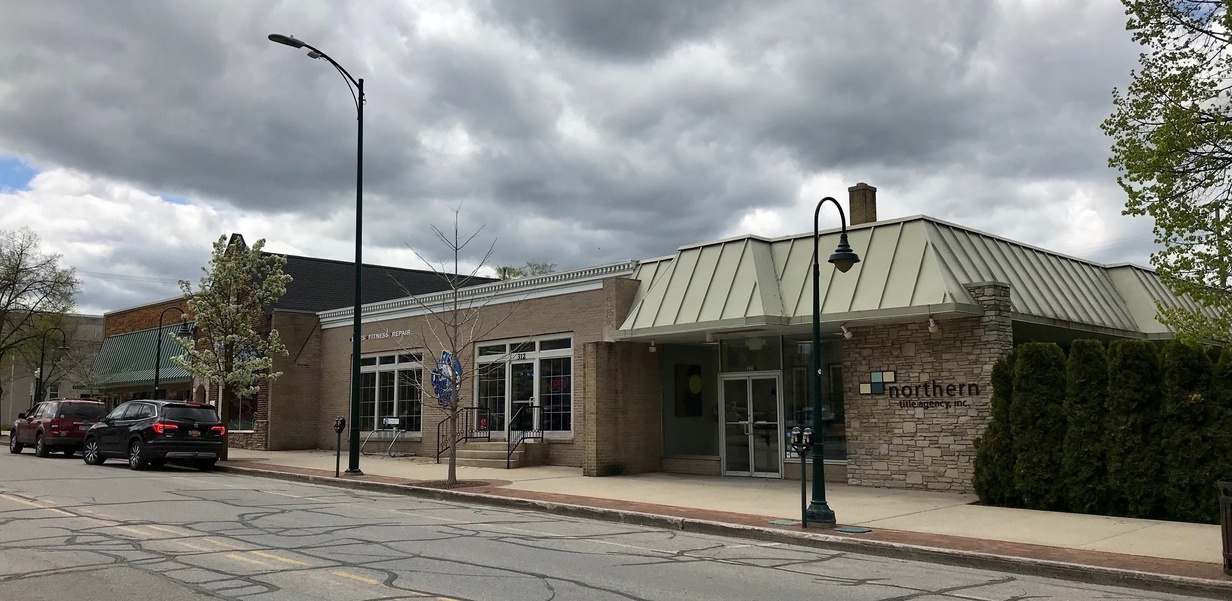
Third Downtown Bank Project Planned; City To Discuss Commercial Versus Housing Priorities
By Beth Milligan | May 24, 2019
Michigan State University Federal Credit Union is planning to open a regional branch office in downtown Traverse City – becoming the third bank in six weeks to announce a major downtown expansion. The project is also prompting discussion among city officials about relaxing building requirements downtown to encourage more office and commercial growth versus high-end condominiums.
Commercial realtor Scott Hardy of Three West is representing the property seller in the deal with MSU Federal Credit Union, which has signed a purchase agreement for a one-story building at 312 South Union Street across from Lay Park (pictured). The site is currently home to Northern Title Agency and part of City Bike Shop’s space; the former would move out once a deal is finalized, while City Bike Shop would likely relocate or consolidate into its neighboring space at 322 South Union, according to Hardy. MSU Federal Credit Union also has a contract on a second property in Traverse City, Hardy says, though he declined to identify the location. News of the Union Street project comes on the heels of announcements that 4Front Credit Union will open a new regional administrative center at the corner of Pine and Front streets and Honor Bank will begin construction on a four-story complex at 415 East Front Street this summer.
Hardy recently appeared before Traverse City planning commissioners to discuss the MSU Federal Credit Union project, which will mark the company’s first foray into northern Michigan. “The Old Town business (district) could really use the infusion of taxes and business activities” the bank headquarters will bring, Hardy told planning commissioners, adding that the company “is prepared to invest millions of dollars” into its new office complex.
The Union Street building is located in the C-2 zoning district, which limits commercial buildings to a maximum of 30 feet, or two stories high. However, developers can receive a “bonus” third floor – building up to 45 feet – if they include residential units in the space. MSU Federal Credit Union is seeking city approval to instead build three floors of exclusively commercial space, either through a conditional rezoning of their parcel or through a zoning text amendment that would change the rules for the entire C-2 district.
Hardy says he sat on the city commission over a decade ago when leaders adopted the residential bonus rule. They did so to encourage more housing downtown – a goal Hardy says has since been met, with demand for office and commercial space now overtaking condominiums. “I think we’re to a point now where that residential bonus has served its purpose, and the market forces right now are creating the residential housing we want downtown,” Hardy told planning commissioners. “It’s not to say that we don’t still need downtown housing, but I think the market forces are starting to determine that on their own.”
City planning staff and several planning commissioners appeared to agree, expressing their willingness to revisit the residential bonus rule. “Right now, I would like workspace bonus,” said Planning Commission Chair Linda Koebert. “I want more jobs and more offices for people really working. I am tired of building units that people buy to live in for two months (out of the year). I think it’s going to ruin our downtown.”
Commissioner Brian McGillivary said he was also open to the credit union’s request. “There’s a demand for office space in this community and it’s not being filled, and people are willing to put it in the city, not just outside the city,” he said. “I understand you want to encourage more housing, but there’s also a need for more offices to bring better-paying jobs.”
Part of the challenge, commissioners agreed, was that the residential bonus rule does not dictate what kind of housing developers must build, such as low-income or affordable rental units. Because of the cost of land in downtown Traverse City – Hardy said MSU Federal Credit Union is paying “well over one million dollars” for the Union Street parcel – developers taking advantage of the residential bonus rule frequently construct the most expensive housing possible. “(The rule) incents them to then go to market-rate housing, to the highest best use, and that’s where you get million-dollar condos,” Hardy said. “Because you need to recover the cost of the land, plus construction.”
A potential solution could be MSU Federal Credit Union seeking a conditional rezoning of its parcel – typically a 2-3 month process – which would allow that project to proceed while city leaders consider the larger goals of downtown and whether they want to rewrite zoning rules across the board to encourage certain types of development. Eliminating the residential bonus rule entirely could allow for more commercial growth throughout the C-2 district. Officials could also take a different tact and instead modify the bonus rule to require a workforce or affordable housing component. City Planning Director Russ Soyring says another option could be to have developers pay into a housing fund to receive bonus height – not necessarily requiring them to build housing themselves, but contributing to a city fund that would underwrite housing elsewhere. “I think we do want to have that discussion” as a planning commission about revisiting the rule, Soyring says.
In the meantime, Hardy says he expects the MSU Federal Credit Union deal for the Union Street parcel to be finalized this summer, with the group then moving forward with planning. Hardy, who also sits on Traverse City's Downtown Development Authority (DDA) board, says he believes the project could be a boon to the Old Town area. “Right now, Old Town and its TIF (tax increment financing) plan rises and falls on what Hagerty does,” he says. “It’d be nice to have other people invest in that district, to enhance the revenue coming from Old Town.”
Comment






